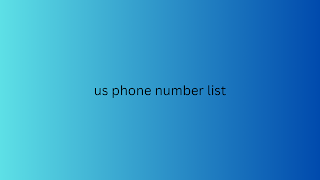Personal data vs. pseudo-anonymous data
Posted: Sun Dec 22, 2024 6:55 am
Data subject: the natural person whose personal data are processed, for example a visitor, lead, customer or applicant, etc.
Controller/responsible: the (legal) person who determines the purpose and means of data processing, for example your own organization
Processor: the (legal) person who processes personal data on behalf of the controller. Think of partners/suppliers such as your digital media agency, Google as the owner of Google Analytics or that freelancer you sometimes use to support the digital marketing department.
5 legal requirements
In addition, the GDPR has five crucial legal requirements that you should always keep in mind:
Opt-in/opt-out: the data subject must have full control over who has access to which personal data and at what time
Clarity about the manner and effectiveness of data processing: the data subject must at all times be informed in an accessible manner about the who, what, how and why of data processing. Think not only about the findability of information, but also about clear language use
Ownership: the data subject is and remains the owner of the personal data relating to him or her. Data controllers must also make this personal data portable or transferable in some cases
Privacy by design : when developing products and services (but also when developing a website), the collection, security and retention period of data must be tailored to the purpose for which the data is processed
Privacy by default : means that you take technical and organizational measures to ensure that you only process data that is necessary for the purpose for which you collect it
With the introduction of the GDPR, the definition of personal data has also been tightened. When processing data, a broad distinction can be made between personal data, pseudo-anonymous us phone number list data and anonymous data. The table below shows some examples relevant to digital marketing.
10
show resultsTo search:
Personal data Pseudo-anonymous data Anonymous data
Definition Identified or identifiable person Not traceable to a natural person without additional information, but individualizable Outside the scope of GDPR
Examples Name and address details Hashed email address

Phone number UserID
Email address OrderID
IP address CustomerID
MAC address (deviceID) Data via tracking scripts
Date of birth
Location data (GPS)
1 to 9 of 9 resultsPreviousNext
With the introduction of the GDPR, more data types fall under personal data than under the current legislation. But there are more important differences with a major impact on your website and digital marketing activities.
Controller/responsible: the (legal) person who determines the purpose and means of data processing, for example your own organization
Processor: the (legal) person who processes personal data on behalf of the controller. Think of partners/suppliers such as your digital media agency, Google as the owner of Google Analytics or that freelancer you sometimes use to support the digital marketing department.
5 legal requirements
In addition, the GDPR has five crucial legal requirements that you should always keep in mind:
Opt-in/opt-out: the data subject must have full control over who has access to which personal data and at what time
Clarity about the manner and effectiveness of data processing: the data subject must at all times be informed in an accessible manner about the who, what, how and why of data processing. Think not only about the findability of information, but also about clear language use
Ownership: the data subject is and remains the owner of the personal data relating to him or her. Data controllers must also make this personal data portable or transferable in some cases
Privacy by design : when developing products and services (but also when developing a website), the collection, security and retention period of data must be tailored to the purpose for which the data is processed
Privacy by default : means that you take technical and organizational measures to ensure that you only process data that is necessary for the purpose for which you collect it
With the introduction of the GDPR, the definition of personal data has also been tightened. When processing data, a broad distinction can be made between personal data, pseudo-anonymous us phone number list data and anonymous data. The table below shows some examples relevant to digital marketing.
10
show resultsTo search:
Personal data Pseudo-anonymous data Anonymous data
Definition Identified or identifiable person Not traceable to a natural person without additional information, but individualizable Outside the scope of GDPR
Examples Name and address details Hashed email address

Phone number UserID
Email address OrderID
IP address CustomerID
MAC address (deviceID) Data via tracking scripts
Date of birth
Location data (GPS)
1 to 9 of 9 resultsPreviousNext
With the introduction of the GDPR, more data types fall under personal data than under the current legislation. But there are more important differences with a major impact on your website and digital marketing activities.